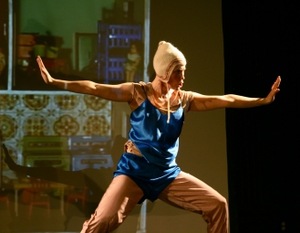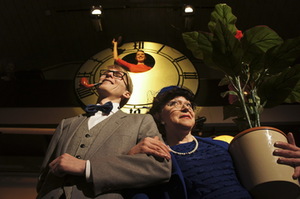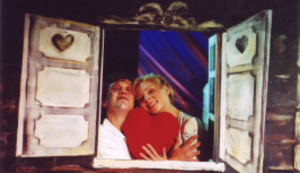NONCOMMITTAL IMPRESSIONS FROM THEATRE LIFE OF KAUNAS (II) 0
In brief: Theatres will soon end their seasons and will close until next autumn. Eternity of silence will last till September. These texts will also turn silent soon, therefore one must hurry up.
Mono of the Chamber Theatre
The Chamber Theatre deserves compliments for its unique mission – the Monobaltija International One-Actor Theatre Festival held for the third time this year. One of the strongest performances of the festival was ‘Sleep When you are Dead’ by the Finnish Anna Veijalainen. The actress Minna Puolanto played a domestic play about a hard life of a housewife with three little children. The performer succeeded to reflect the psychological state of a tired woman by using accurate dance movements and pantomime. A direct relationship with viewers and the plot was supported by the musician Timo Hirvonen who played live on stage. The jury of the festival awarded the performance the third prize.
Ionesco in Kaunas
The theatre also premiered ‘The Bald Soprano’ after Eugene Ionesco, directed by Stanislovas Rubinovas. The genre of absurd drama of the late fifties is staged at the twenty-first-century theatre. How does modern art affect the postmodern mind?
The embodiment of the meaningless meets viewers at the door. The actresses Edita Niciūtė and Alma Masiulionytė shout erratic phrases and repeat their senseless cycle of speech. An ‘instructor’ (actress Daiva Škelevaitė) seats the audience; a clock with a smiling maid (actress Simona Blandženauskaitė) announces random time; the performance starts. We see two partners on stage – a true Englishman (actor Vytautas Gasiliūnas) and a true Englishwoman (actress Kristina Kazakavičiūtė). They speak senselessly about the supper they had. Later their English friends come by, an angry and sometimes extremely cheerful maid walks around, and a fireman (actor Aleksandras Rubinovas) appears to tell a joke about a bald soprano at the end. The play is full of absurd and paradoxical situations. The viewers laugh and snort.
However, an old absurd play asks for new medium interpreted by the postmodern mind. Now we just travel back to the fifties. Kitschy scenography by Sergėjus Bocullo also does not look tasteful. On the whole, the performance is joyful, dynamic and paradoxical thus worth seeing. But is it a truly successful director‘s solution?
Smell of Naphthalene at Kaunas Pantomime Theatre
The only Lithuanian pantomime theatre left a dismal impression. Maybe it was a certain performance to blame – ‘Love Fervently’ by Arūnas Katkauskas, presented as a theatrical-musical comic with melodies of foxtrot, tango and waltz.
The performance resembled of a ‘barn theatre’ with its sets of village cottages, firs and costumes. Finally the actors started to throw a plush heart at each other, which, apparently, symbolised their love. What can be worse than that?
Sadly, the whole repertoire of the theatre looks barely alive with one or two premieres per year. The theatre should consider merging with some other theatre.
Fratti, Death and the Small Theatre
The Small Theatre premiered Mario Fratti’s ‘Sister’ by Artūras Žukauskas that day. There was plenty of cold and cumbersome material on stage – an ice cube and stones later shattered by the young family man Carlo (actor Rokas Petrauskas). With the melting ice secrets were revealed by Carlo, Margaret (actress Doloresa Kazragytė) and Rosanna (actress Eglė Mikulionytė).The atmosphere was even sharpened by horrifying music of the composer Antanas Jasenka. However, the hidden truth seemed too predictable, and the growing tension and intrigue should not have been presented so obviously. Perhaps this is a hint to Mario Fratti himself.
Nice Climate of Kaunas Puppet Theatre
Puppets of Kaunas started to speak both to children and adults – the premiere of the ‘Journey towards the Sun’ by the director Boris Konstantinov (St. Petersburg) visited Kaunas. Impressive puppets and scenography by Viktor Antonov and music by Denis Shadrin invited to a feast for eyes and ears.
The story is about a wandering street musician and circus performers met in a railway station. The stage reminds of a train with another black stage inside of it. Characters seem to move in the air without any human participation. Actors controlling the puppets are invisible, though one puppet is managed skilfully by six hands. The principle of the Black Cabinet is used here, which creates a fairy-like, irrational impression.
‘Journey towards the Sun’ is a row of separate stories like train cars, following the main plot. Since the main subject is travelling, the dominating tone is about separation, friendship and bright sadness with a hint of humour. ‘Journey towards the Sun’ is a truly good and beautiful performance.





